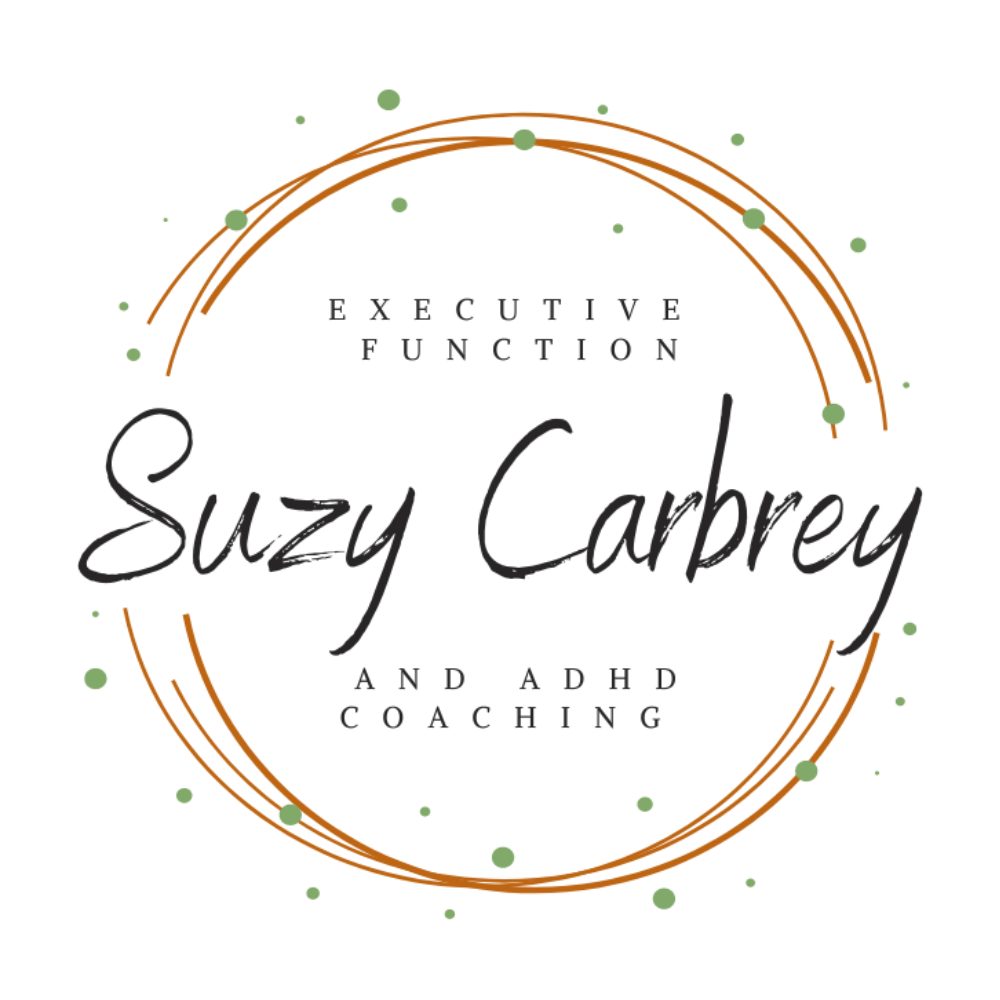Energy Management is written by Suzy Carbrey
Time management is often seen as the key to productivity in our fast-paced world. But what if the real secret to getting more done lies not in managing your time, but in managing your energy? When your energy levels are high, you can approach tasks with greater focus and efficiency, freeing up more time for leisure and recreation. This post delves into the crucial link between energy and productivity, offering practical tips to boost your energy and make the most of your day.

Energy Management for Adults with ADHD
Energy management is especially important for adults with ADHD and those with executive functioning challenges, as their ability to maintain focus, motivation, and productivity is closely tied to their energy levels. Here’s why:
1. Cognitive Fatigue and Focus
- Adults with ADHD are more susceptible to cognitive fatigue, which can significantly impact their ability to stay on task. Managing energy ensures that cognitive resources are preserved for when they are most needed, allowing for better focus and task completion.
2. Regulation of Attention
- ADHD is characterized by difficulties in sustaining attention, especially when tasks are boring or require sustained effort. Proper energy management helps in maintaining the mental stamina required to regulate attention and avoid distractions.
3. Emotional Resilience
- Energy levels directly influence emotional regulation. Low energy can lead to increased irritability, frustration, and impulsivity—common challenges for those with ADHD. By managing energy, individuals can maintain emotional stability, which is key to effective decision-making and interpersonal interactions.
4. Task Initiation and Follow-Through
- Initiating tasks and following through to completion are common challenges for adults with ADHD. High energy levels make it easier to start tasks and maintain the momentum needed to finish them, reducing the likelihood of procrastination or abandonment of tasks.
5. Minimizing Executive Functioning Overload
- Executive functioning involves managing multiple cognitive processes simultaneously. When energy is low, these processes can become overwhelming, leading to paralysis by analysis or decision fatigue. Proper energy management ensures that the brain has the resources it needs to manage these tasks effectively.
6. Reducing the Need for Hyperfocus
- Individuals with ADHD often rely on periods of hyperfocus to compensate for productivity dips. While hyperfocus can be productive, it is also exhausting and unsustainable. By managing energy levels, the need to rely on hyperfocus is reduced, promoting a more balanced and sustainable approach to productivity.
7. Supporting Consistent Routines
- ADHD can make it difficult to establish and maintain consistent routines. High energy levels support the ability to stick to routines, which is essential for creating structure and reducing chaos in daily life. This consistency is key to managing ADHD symptoms and improving overall quality of life.
8. Improving Overall Well-being
- Energy management is not just about productivity; it also plays a role in overall well-being. When energy levels are managed effectively, individuals are more likely to engage in activities that promote physical and mental health, such as exercise, socializing, and pursuing hobbies.
By focusing on energy management, adults with ADHD and those with executive functioning challenges can improve their ability to manage their time effectively, reduce stress, and enhance their overall quality of life.

The Foundation of Energy Management: Sleep
Good sleep is the cornerstone of energy management, and this is especially true for adults with ADHD. ADHD often brings challenges such as restless energy, difficulty unwinding, and racing thoughts, which can make it harder to achieve quality sleep. However, without enough rest, even the most carefully planned time management strategies can fall flat.
For adults with ADHD, sleep isn’t just a way to recharge; it’s a critical component in managing symptoms like impulsivity, emotional regulation, and focus. Poor sleep can exacerbate these symptoms, leading to a vicious cycle where the lack of rest further disrupts daily functioning and heightens ADHD-related challenges.
Aim for 7-9 hours of quality sleep each night. Creating a sleep-friendly environment by keeping your bedroom cool, dark, and quiet is essential, but it’s equally important to establish a consistent bedtime routine. Consistency in sleep and wake times helps regulate your body’s internal clock, which can be particularly beneficial for those with ADHD who may struggle with maintaining routines.
If falling asleep is a challenge, winding down with a relaxing activity such as reading or taking a warm bath can help. Limiting screen time before bed is also crucial, as the blue light emitted by phones and computers can interfere with your body’s natural sleep-wake cycle, making it harder to fall asleep and stay asleep.
For adults with ADHD, prioritizing sleep isn’t just about getting enough hours; it’s about improving the quality of those hours. Quality sleep can reduce the intensity of ADHD symptoms, improve cognitive function, and enhance emotional regulation, making it easier to wake up refreshed and ready to face the day. By placing a strong emphasis on sleep, you’re laying a solid foundation for better energy management, which in turn supports overall executive functioning and daily productivity.

Habits That Fuel Your Energy Management and Support Executive Functioning
Energy isn’t just about sleep—it’s also about the daily habits that fuel your body and mind, especially when managing executive functioning challenges. Consider these key habits:
Nutritious Eating: Food is your body’s fuel, and maintaining steady energy levels is crucial for effective executive functioning. A balanced diet helps sustain focus and productivity throughout the day. It’s important not to skip meals, as hunger can exacerbate issues like distractibility and irritability. Be mindful of excessive sugar and processed foods, which can cause energy crashes and make it harder to stay on track.
Physical Activity: Exercise is a natural energy booster that also enhances executive functioning by improving circulation, mood, and sleep quality. Regular movement helps regulate your energy levels and can sharpen your ability to plan, prioritize, and follow through on tasks. Aim for moderate exercise most days of the week, whether it’s a brisk walk, a yoga session, or even dancing around the house.
Socializing: Human connection is essential for emotional well-being and can significantly impact your energy and executive functioning. Socializing provides a mental reset, reduces stress, and can make you feel more grounded and energized. Whether it’s a quick chat with friends or a phone call with family, these interactions can help you regain focus and improve your ability to manage daily tasks effectively.

Afternoon Energy Management Reset Routine
We all know the feeling of hitting a wall in the afternoon. Instead of reaching for another cup of coffee, try implementing an energy reset routine to get you back on track.
Move Your Body: A quick stretch or a short walk can do wonders for your energy levels. Moving around helps increase circulation and can give you the boost you need to power through the rest of your day.
Hydrate: Dehydration is a common cause of fatigue. Keep a water bottle on your desk and sip regularly throughout the day. A glass of water with a slice of lemon or cucumber can be particularly refreshing.
Mindful Breathing: Take a few minutes to practice deep, mindful breathing. Inhale slowly through your nose, hold for a few seconds, and then exhale through your mouth. This simple exercise can help reduce stress and re-energize your mind.
NASA Nap: The NASA nap, a brief 26-minute power nap, is an effective way to recharge during the day. Originally researched by NASA in 1995, this nap length was found to maximize job performance and alertness while minimizing the grogginess often associated with longer naps. In studies, pilots who took a 26-minute nap experienced a significant increase in alertness and improvement in job performance. To take a proper NASA nap, aim to fall asleep within the first 6 minutes, and allow yourself to rest for the remaining 26 minutes. You’ll wake up feeling refreshed and ready to tackle the rest of your day.
Healthy Snack: If you’re feeling sluggish, a small snack that combines protein and complex carbohydrates—like an apple with peanut butter or a handful of nuts—can give you a steady energy boost.
Mental Break: Step away from your work for a few minutes. Close your eyes, listen to some calming music, or engage in a brief meditation. Giving your brain a break can help you return to your tasks with renewed focus.

Conclusion: Energy Management Leads to Efficiency
Effective time management isn’t just about organizing your schedule; it’s also about managing the energy that fuels your productivity. For adults with ADHD and those facing executive functioning challenges, effective energy management unlocks consistent focus, emotional resilience, and the ability to follow through on tasks. Prioritizing quality sleep, cultivating energizing habits, and incorporating afternoon reset routines lay the foundation for sustained productivity and overall well-being. When your energy is well-managed, your time is utilized more effectively, leaving ample room for leisure and activities that enrich your life.
When you are well-rested, well-nourished, and energized, tasks that once felt overwhelming become easily manageable. This efficiency frees up more time for what matters most—whether it’s spending time with loved ones, pursuing hobbies, or simply relaxing.
The key to effective time management isn’t about squeezing more tasks into your day but about being in the optimal state to tackle those tasks with energy and enthusiasm. Take care of your energy, and you’ll see both your productivity and free time flourish.
Learn more about Energy Management with Online Coaching for Executive Functioning / ADHD
Ready to gain control and enhance your executive functioning? As an experienced and compassionate coach, I specialize in providing support for executive functioning and ADHD. To embark on your journey, please reach out to me at 708-264-2899 or email hello@suzycarbrey.com to schedule a FREE 20-minute discovery call consultation.
With a background as a speech-language pathologist, I have a strong foundation in executive functioning coaching. My graduate degree program in SLP placed a significant emphasis on cognition, including executive functions, and I have years of experience in medical rehabilitation, providing cognitive-communication therapy. Additionally, I have completed an ADHD Services Provider certification program, I am Solutions-Focused Brief Therapy Diamond Level 1 certified and I am trained in the Seeing My Time® executive functioning curriculum.
Experience the convenience and effectiveness of online coaching, backed by studies that demonstrate equal results to in-person services. Parents, professionals, and emerging adults love the convenience and privacy of receiving coaching from their own homes.
Whether you reside in Chicago, Milwaukee, Indianapolis, Kansas City, or anywhere else around the globe, I am here to assist you. Schedule your discovery call consultation today, and I eagerly anticipate the opportunity to work with you!
Please note that although I am a certified speech-language pathologist, all services Suzy Carbrey LLC provides are strictly coaching and do not involve clinical evaluation or treatment services. If you require a formal speech therapy evaluation and treatment, please inform me, and I can provide appropriate recommendations.

